Euro elections – Who are your new MEPs in the East and West Midlands, Yorkshire and the Humber, and Wales?
Democratic Audit has recently been attempting to improve the feedback that voters receive after they cast their vote at the polling station. Having already previewed each of the contests, and provided information as to what happened in England’s southernmost regions, the Democratic Audit team are providing brief details and links to learn more about all the new MEPs elected on May 22nd. Here, we look at the East and West Midlands, Yorkshire and the Humber, and Wales.
The East Midlands constituency (5 seats)
Full election results for this region can be found on Wikipedia here
UKIP ‘s MEPs for the East Midlands
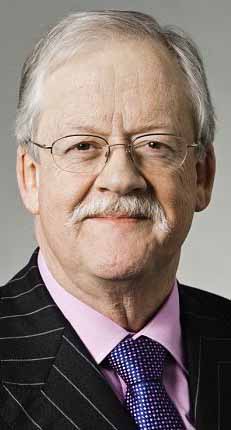
 Roger Helmer, was comfortably re-elected as an MEP for a third time, but only first time around for UKIP, having previously represented the Tories from 1999 until he defected after the 2009 elections. Helmer is known for his colourful views on a number of topics, and for his full-throated opposition to Britain’s membership of the EU, and his Votewatch EU profile is here. He was recently announced as his party’s candidate for the forthcoming Newark by-election. His Twitter account is here.
Roger Helmer, was comfortably re-elected as an MEP for a third time, but only first time around for UKIP, having previously represented the Tories from 1999 until he defected after the 2009 elections. Helmer is known for his colourful views on a number of topics, and for his full-throated opposition to Britain’s membership of the EU, and his Votewatch EU profile is here. He was recently announced as his party’s candidate for the forthcoming Newark by-election. His Twitter account is here.
Joining him in Brussles UKIP’s list is Margot Parker, who was UKIP’s unsuccessful candidate in the Corby by-election in 2012. She has also been Director of Eurocom-Consult, a well-known organisation working in public communications and consultancy on a European level. She, too, was comfortably elected owing to her party’s strong showing.
The Conservatives MEPs for the East Midlands

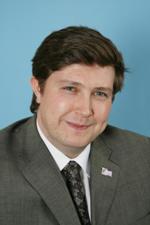 Emma McLarkin was first on their list for the region and was accordingly re-elected comfortably. The well-respected Euro-think tank Votewatch EU has an authoritative profile giving details of her record in the Parliament here. Before becoming an MEP, McLarkin worked in law and in public affairs, and her Twitter account is here.
Emma McLarkin was first on their list for the region and was accordingly re-elected comfortably. The well-respected Euro-think tank Votewatch EU has an authoritative profile giving details of her record in the Parliament here. Before becoming an MEP, McLarkin worked in law and in public affairs, and her Twitter account is here.
Andrew Lewer is the second on the Conservatives list and stands a good chance of being elected (replacing the defector Roger Helmer). However, he seems to be new to the digital era, and does not appear to have a Twitter account or a personal website.
Labour’s MEP for the East Midlands
 Glenis Willmott was the sole Labour candidate to see themselves re-elected. An MEP since 2006, she joined the Parliament after the death of Phillip Whitehead, before winning her seat in her own right in 2009. She is the leader of the Labour Grouping in the European Parliament, and her Votewatch EU profile can be found here. Before becoming an MEP Willmott worked in trade unions, and as a political assistant, and here Twitter account is here.
Glenis Willmott was the sole Labour candidate to see themselves re-elected. An MEP since 2006, she joined the Parliament after the death of Phillip Whitehead, before winning her seat in her own right in 2009. She is the leader of the Labour Grouping in the European Parliament, and her Votewatch EU profile can be found here. Before becoming an MEP Willmott worked in trade unions, and as a political assistant, and here Twitter account is here.
Who lost out in 2014?
As in most other seats, the Liberal Democrats lost their only seat in the region, which was held by the long-serving incumbent MEP Bill Newton-Dunn (who had previously represented the Conservatives in the region before defecting to the Liberal Democrats). They finished behind the Greens, with neither party doing well enough to challenge the top three parties. There was a close contest for second place in the region which ultimately led to Rory Palmer, Labour’s second placed candidate, closely missing out.
About the region
The East Midlands region borders Buckinghamshire, Bedfordshire, Cambridgeshire and Norfolk to the south; Yorkshire to the north; and Staffordshire Cheshire and Lancashire to the north and north west. You live in the East Midlands if you are in the big cities of Nottingham, Derby, Leicester, Lincoln or Northampton; or if you are in the surrounding counties of Derbyshire, Nottinghamshire, Leicestershire, Northamptonshire, (most of) Lincolnshire (not the Humberside districts), and Rutland.
—
The West Midlands constituency (7 MEPs)
Full election results for this region can be found on Wikipedia here.
UKIP’s MEPs for the West Midlands


 Jill Seymour was the first candidate elected from the West Midlands region. She is a long-standking UKIP activist who has served on the party’s national committee. Her Twitter account is here.
Jill Seymour was the first candidate elected from the West Midlands region. She is a long-standking UKIP activist who has served on the party’s national committee. Her Twitter account is here.
James Carver also won comfortably as UKIP’s second placed candidate for the West Midlands. He has worked for the party in a number of different capacities since the mid 1990s, including as an assistant to Nigel Farage. He is also a bespoke umbrella maker. His Twitter account is here.
Bill Etheridge won the final seat on offer for the constituency from his position as UKIP’s third placed candidate. He is currently the regional organiser for the Campaign against Political Correctness, and a hospital governor. He is also UKIP’s Parliamentary candidate for the Dudley North constituency. His Twitter account is here.
Labour’s MEPs for the West Midlands

 Neena Gill saw herself return to the European Parliament at the elections, winning the second seat on offer. She had previously served in Brussels between 1999 and 2009. Prior to becoming a Member of the European Parliament, she was Chief Executive of ASRA Group and the Newlon Housing Group. In her previous decade in the European Parliament she held a number of committee posts and external relations positions. More information about her time in the Parliament can be found here and her Twitter account is here.
Neena Gill saw herself return to the European Parliament at the elections, winning the second seat on offer. She had previously served in Brussels between 1999 and 2009. Prior to becoming a Member of the European Parliament, she was Chief Executive of ASRA Group and the Newlon Housing Group. In her previous decade in the European Parliament she held a number of committee posts and external relations positions. More information about her time in the Parliament can be found here and her Twitter account is here.
Sion Simon saw himself claim the fifth seat on offer. He was previously the MP for Birmingham Erdington (2001-2010) before stepping down to pursue an unsuccessful campaign for the Mayoralty of Birmingham. In Parliament, he was a Junior Minister in the Department for Innovation, Universities and Skills, and the Department for Culture, Media and Sport. More information about his time as an MP can be found here. His Twitter profile is here.
The Conservatives MEPs for the West Midlands

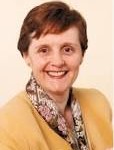 Elected for the Conservatives was their incumbent MEP Philip Bradbourn, who claimed the third seat on offer. First elected as an MEP in 1999, he is seeking re-election for the fourth time. His Votewatch EU profile shows details of his attendance record, committee assignment and parliamentary activities here.
Elected for the Conservatives was their incumbent MEP Philip Bradbourn, who claimed the third seat on offer. First elected as an MEP in 1999, he is seeking re-election for the fourth time. His Votewatch EU profile shows details of his attendance record, committee assignment and parliamentary activities here.
Also claiming a seat for the Tories was Anthea McIntyre who was appointed to the European Parliament following the implementation of the Lisbon Treaty. Previously, she was a Management Consultant and businesswoman. Her Twitter account is here. Her Votewatch EU profile can be found here.
Who lost out in 2014?
Unusually, two MEPs – Nikki Sinclaire, and Mike Nattrass – stood unsuccessfully for re-election for smaller parties, having both left UKIP at different points during the previous Parliament. More information about them can be found on Nattrass here, and Sinclaire here.
In keeping with their national results, the Liberal Democrats lost their incumbent MEP Phil Bennion, who had only been in the European Parliament for two years following the resignation of his predecessor. For the Conservatives, the former professional cricketer Daniel Dalton missed out, while for Labour, the former MP Lynda Waltho (who lost her seat at the 2010 General Election also didn’t see her party perform well enough to see her return to elected office.) Despite some encouraging local election results in the region, the Greens did not perform nearly strong enough to see Will Duckworth elected.
About the region
The West Midlands contains the counties for Shropshire, Staffordshire, Warwickshire, Worecestershire, and the metropolitan country known as the East Midlands (this contains the metropolitican districts of Birmingham, Coventry, Dudley, Sandwell, Solihull, Walsall, and Wolverhampton. Additionally the region contains the Shropshire, Helford and Wreckin, and Stoke on Trent Unitary Authorities.
—
Yorkshire and the Humber (6 MEPs)
Full election results for this region can be found on Wikipedia here.
UKIP’s MEPs for Yorkshire and the Humber


 Jane Collins was UKIP’s top candidate for the region, and accordingly saw herself comfortably elected. She replaced the controversial outgoing MEP Godfrey Bloom. She previously stood unsuccessfully as a Parliamentary candidate for the party in two Yorkshire by-elections. Her Twitter account is here.
Jane Collins was UKIP’s top candidate for the region, and accordingly saw herself comfortably elected. She replaced the controversial outgoing MEP Godfrey Bloom. She previously stood unsuccessfully as a Parliamentary candidate for the party in two Yorkshire by-elections. Her Twitter account is here.
Amjan Bashir also won comfortably, having won the fourth seat on offer in the region. He gained media attention for publicly challenging former Deputy Prime Minister Michael Heseltine to a debate over his accusations that UKIP is racist. He is a businessman and entrepreneur.
Mike Hookem is UKIP’s third place candidate, and is currently the Chairman of the party’s Yorkshire and North Lincolnshire Region committee. He has previously stood unsuccessfully at various council elections and the Hull East seat at the 2010 General Election. He is on Twitter here. He was an outside bet for election, but the scale of UKIP’s triumph at these elections means that he won the final seat on offer.
Labour’s MEPs for Yorkshire and the Humber

 Labour’s saw their incumbent MEP Linda McAvan comfortably re-elected for the fourth time, having first gained a seat in a 1998 by-election under the old First Past the Post system. Information about her record in the Parliament can be found on the website of the independent organisation Votewatch EU. She is the Vice President of the European Parliament’s Socialist Group. She is married to the Labour MP Paul Blomfeld. She is on Twitter, and her account can be found here. Her election was never in doubt.
Labour’s saw their incumbent MEP Linda McAvan comfortably re-elected for the fourth time, having first gained a seat in a 1998 by-election under the old First Past the Post system. Information about her record in the Parliament can be found on the website of the independent organisation Votewatch EU. She is the Vice President of the European Parliament’s Socialist Group. She is married to the Labour MP Paul Blomfeld. She is on Twitter, and her account can be found here. Her election was never in doubt.
The former MEP Richard Corbett, who served in the Parliament between 1996 and 2009, was also elected for the Labour Party. He is well known known for his in-depth knowledge of the workings of the European Union and as an advocate for democratic reform. He has worked as an adviser to Hermann Von Rompuy, a spokesman for Labour and the Party of European Socialists in the European Parliament, and in the voluntary sector. His Twitter account can be found here. He claimed seat 5 of 6 in the region.
The Conservatives’ MEPs for Yorkshire and the Humber
Timothy Kirkhope won the third seat in the region relatively comfortably, despite the Tories’ poor showing. He has been an MEP since 1999. Before that he was the MP for Leeds North East from 1987 to 1997, and served as a Parliamentary Under-Secretary of State in the Home Office. In the European Parliament he was previously the Leader of the small Conservative Party grouping and he is now the Deputy Chair of the European Conservative and Reformist grouping. Information about his career as an MEP can be found on his Votewatch EU profile. He is on Twitter here.
Who missed out in 2014?
The incumbent MEP, and recent defector to the Liberal Democrats Edward MacMillan Scott saw his party’s poor fourth place showing deprive him of his seat. His performance is in keeping with his parties’ dismal showing right across the country. The third placed candidate for Labour, Eleanor Tunnicliffe, will be disappointed that Labour did not top the poll, meaning that she win a seat. The Green Party’s top candidate Andrew Cooper will be pleased that his party finished above the Liberal Democrats, but in reality they finished a long way away from being competitive for a seat.
About the region
The Yorkshire and Humberside region borders has border with Teeside to the north, Lancashire to the west, and Lincolnshire to the south. It includes the whole of the historical large county of Yorkshire, plus the southern shore of the Humber in Lincolnshire. You are in this region if you live in the big cities of Leeds, Bradford, Halifax, Sheffield, Barnsley, Doncaster, Rotherham, Huddersfield, Wakefield, Hull or York; or the surrounding counties of North Yorkshire and the East Riding of Yorkshire; or the council areas for Calderdale and Kirkless, or North and North east Lincolnshire.
—
Wales (4 MEPs)
Full election results for this region can be found on Wikipedia here.
Labour’s MEP for Wales
 Labour came top in the region and saw their number one candidate Derek Vaughan claim the first available seat. He is an incumbent MEP, who was first elected in 2009. Prior to his election, he was a trade union official and a councillor, as well as the leader of the Welsh Local Government Association. In the European Parliament he sits on the Committee on Budgets. Derek is also a member of the Delegation for relations with the People’s Republic of China. Full details about his activities in the European Parliament can be found on the authoritative profiles maintained by the independent Group Votewatch EU profile here. He is active on social media, and on Twitter is here.
Labour came top in the region and saw their number one candidate Derek Vaughan claim the first available seat. He is an incumbent MEP, who was first elected in 2009. Prior to his election, he was a trade union official and a councillor, as well as the leader of the Welsh Local Government Association. In the European Parliament he sits on the Committee on Budgets. Derek is also a member of the Delegation for relations with the People’s Republic of China. Full details about his activities in the European Parliament can be found on the authoritative profiles maintained by the independent Group Votewatch EU profile here. He is active on social media, and on Twitter is here.
UKIP’s MEP for Wales
 UKIP finished an impressive second in Wales, seeing their number one candidate Nathan Gill elected. He is currently the party’s Membership Secretary in Wales. A businessman, he has stood at council level for the party, but never successfully. His Twitter account is here.
UKIP finished an impressive second in Wales, seeing their number one candidate Nathan Gill elected. He is currently the party’s Membership Secretary in Wales. A businessman, he has stood at council level for the party, but never successfully. His Twitter account is here.
The Conservatives’ MEP for Wales
 The incumbent MEP Kay Swinburne, won the third available seat for the Conservatives. She was first elected as a Conservative MEP in 2009. Originally a microbiologist by profession, she holds a number of positions in the European Parliament, including as UK Conservative Spokesperson on Economic and Monetary Affairs, and her VoteWatch EU profile can be found here.
The incumbent MEP Kay Swinburne, won the third available seat for the Conservatives. She was first elected as a Conservative MEP in 2009. Originally a microbiologist by profession, she holds a number of positions in the European Parliament, including as UK Conservative Spokesperson on Economic and Monetary Affairs, and her VoteWatch EU profile can be found here.
Plaid Cymru’s MEP for Wales
 Jill Evans, an incumbent MEP, also saw herself re-elected to the European Parliament for the third time, having first been elected in 1999. She has served in a number of positions, including as the party’s Chair and as the Chair of the Wales branch of the Campaign for Nuclear Disarmament. In the European Parliament she is President of the European Free Alliance (EFA) grouping of regionalist parties and greens.
Jill Evans, an incumbent MEP, also saw herself re-elected to the European Parliament for the third time, having first been elected in 1999. She has served in a number of positions, including as the party’s Chair and as the Chair of the Wales branch of the Campaign for Nuclear Disarmament. In the European Parliament she is President of the European Free Alliance (EFA) grouping of regionalist parties and greens.
Who missed out in 2014?
Due to the four-way nature of the contest, it was always unlikely that any party would see more than one candidate elected, though Labour stood the best chance. Due to the way things did pan out, Jane Bryant missed out on a second seat for the Labour Party, and the Conservatives lost the second seat that they surprisingly picked up in 2009. The Liberal Democrats were never really in contention in the seat, having failed to win even in 2009 when they performed relatively strongly.
About the region
The boundaries of the Wales European region are the same as the area covered by the Welsh National Assembly. It borders the English counties of Cheshire, Shropshire, Herefordshire, and Gloucestershire to the east. The largest urban areas are Cardiff, Swansea, Newport and then the towns of the south Wales valleys.
—
Note: please read our comments policy before posting. Cover image credit: Tom Ryan, CC BY NC SA 2.0). The shortened URL for this post is: https://buff.ly/1gAdSfV

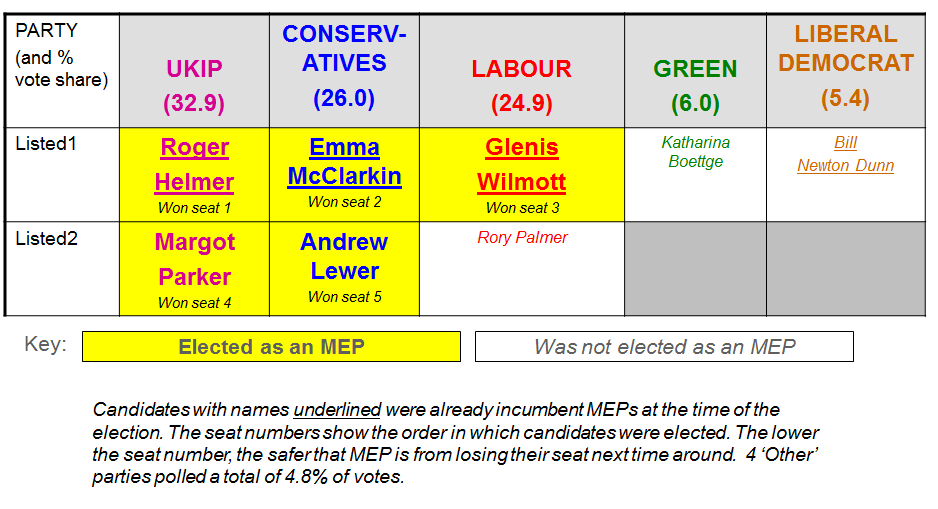
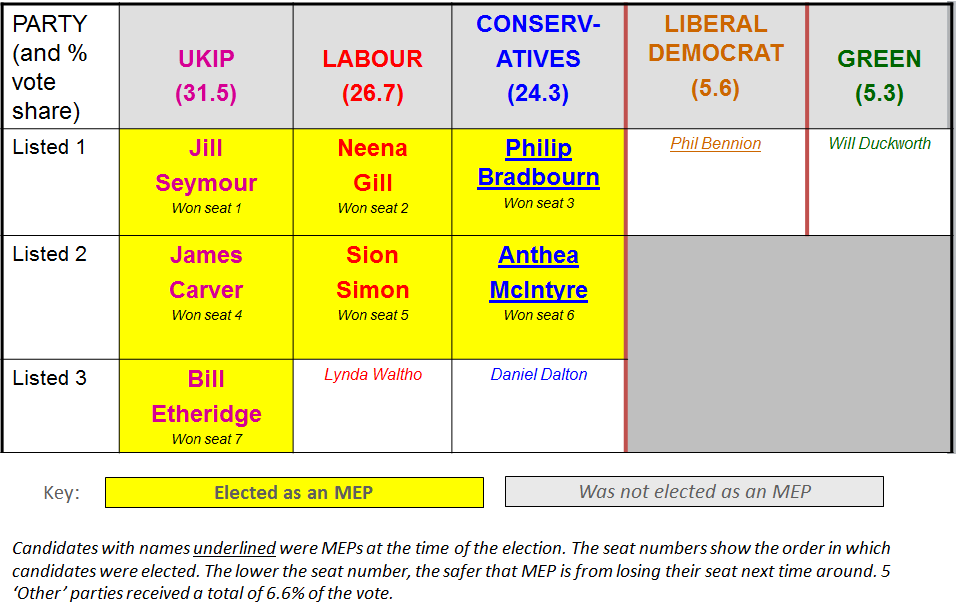
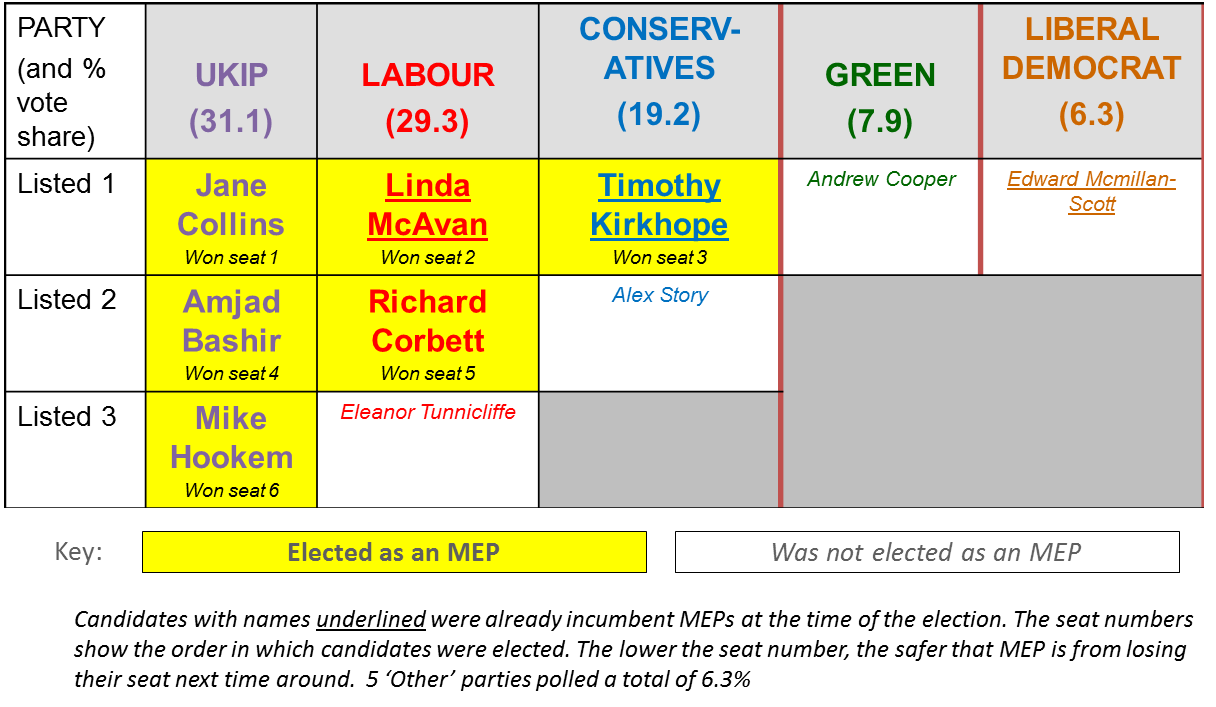

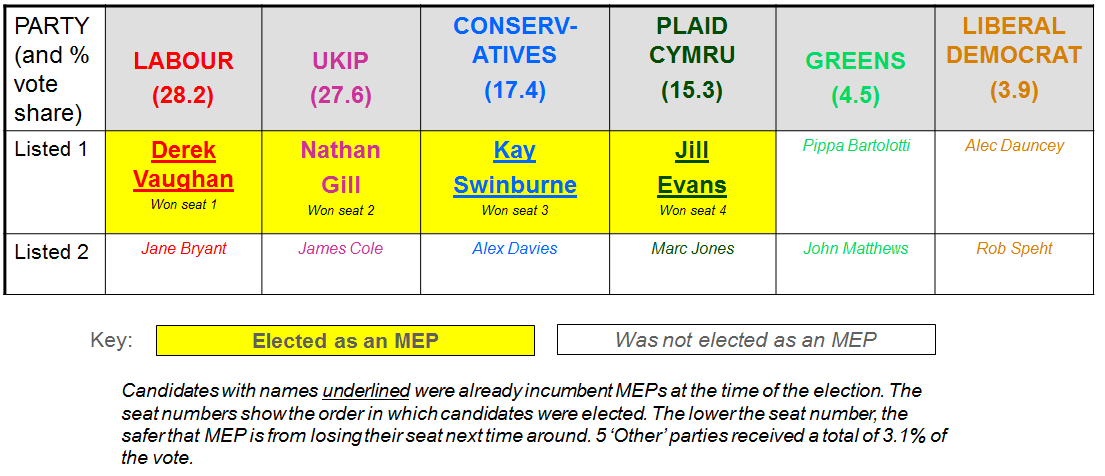




 Democratic Audit's core funding is provided by the Joseph Rowntree Charitable Trust. Additional funding is provided by the London School of Economics.
Democratic Audit's core funding is provided by the Joseph Rowntree Charitable Trust. Additional funding is provided by the London School of Economics.
Euro elections – Who are your new MEPs in the East and West Midlands, Yorkshire and the Humber, and Wales? https://t.co/AsCbCyRMW5
Euro elections – Who are your new MEPs in the East and West Midlands, Yorkshire and the Humber, and Wales? https://t.co/KlRz1rqPGB